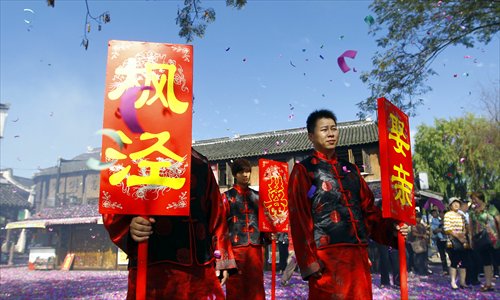

Wedding ceremony officials wait for the couples to arrive. Photo: Yang Hui/GT
A name puzzle
Some of the expat brides and grooms were puzzled by the names of the Chinese wedding dishes. The names of the "eight dishes" - the wedding banquet for the 20 couples - each had a special meaning.
The first course, braised pork leg with soy sauce, was called "rising up, step by step." Wang said this wished the couples an infinitely bright future. The last course of braised eggs in sauce was called "from generation to generation."
As well as the "eight dishes" each couple drank a small bowl of lotus seeds soup - older Chinese believe that by eating lotus seeds, newlyweds will produce babies early.
In Fengjing town there is a private wedding museum, which has more than 300 exhibits including a 100-year-old carved wooden wedding bed and some exquisite wedding dresses.
In the old days in China on her wedding day a bride would be sat in a sedan chair and carried to her husband's home. But in Fengjing, a water town, brides were taken to their new homes in boats.
Shen Liang, the owner of the museum explained that the groom's boat had to be moored to the southeast of the bride's home. "This was believed to bring fortune and prosperity to the couple."
Betrothal gifts
Shen has lived and worked in Fengjing for more than 40 years and said, traditionally, one or two months before the wedding day, the would-be husband would send pinli (betrothal gifts) to the girl's home. The pinli usually contained money, wine and plenty of food including pork legs and sweets. The girl's parents had to prepare a substantial dowry for their daughter. "In the old days, the bigger the dowry that a bride took to the groom's home, the better she would be treated by her husband's family."
Shen said that when he was 10 years old, on the night before his cousin was married, he was asked to sleep in the wedding bed. Locals believed that if a little boy slept in the wedding bed the night before a couple married, the owners of the bed would live a happy life together.
These old customs were very popular in the Ming (1368-1644) and Qing (1644-1911) dynasties, and the first half of the 20th century as well. After the People's Republic of China was established in 1949, many old customs were prohibited or held to be superstitions. When China's opening-up policies were introduced in the late 1970s, traditional wedding customs began to be reinstated.
"Nowadays the grooms in this town tend to go to the bride's home by car instead of boat," Shen told the Global Times. "But the traditional wedding customs, with their history and cultural links, still prove popular with locals and now expats."
Copyright ©1999-2018
Chinanews.com. All rights reserved.
Reproduction in whole or in part without permission is prohibited.